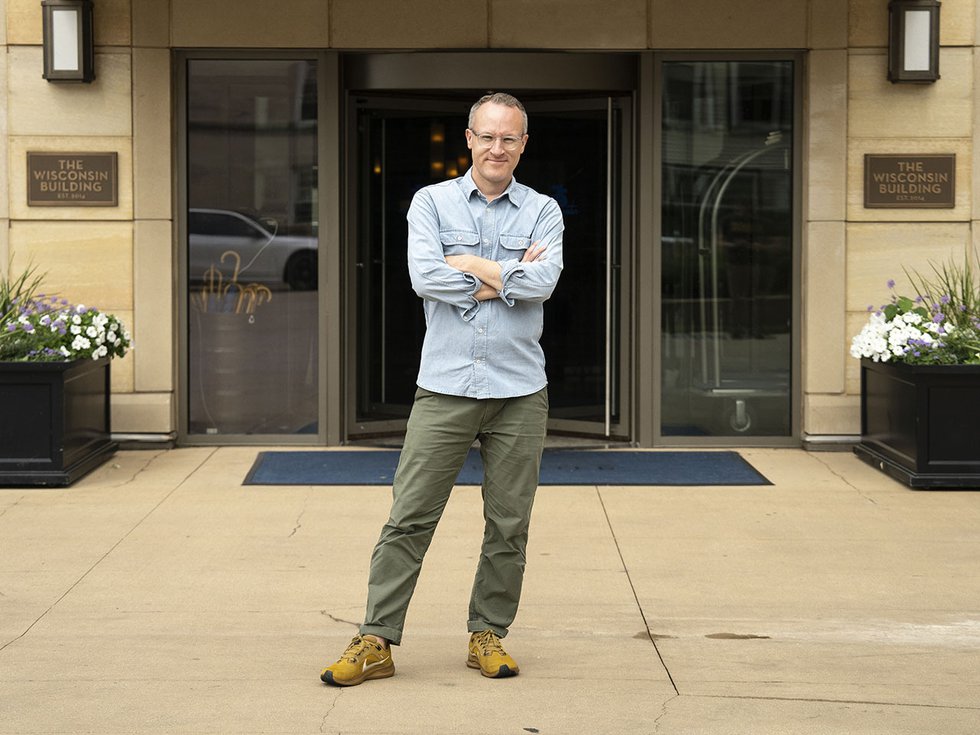The connector – Isthmus | Madison, Wisconsin


It would have taken more than Madison’s worst power outage in half a century to keep Jason Ilstrup from finding his way to the Edgewater Hotel early on the morning of May 22.
The previous night’s storms had zapped the electricity at the Nakoma neighborhood home he shares with his wife and young son. Ilstrup, 47, disengaged his electric garage door, opened it manually, got on his bike — he bikes everywhere — and rode downtown, where he’d preside over a “What’s Up Downtown” breakfast gathering in the Edgewater’s Grand Ballroom.
The organization Ilstrup leads — Downtown Madison Inc. (DMI) — holds nine such meetings a year, and in the past 12 months the breakfast speakers have included Madison Mayor Satya Rhodes-Conway and UW-Madison Chancellor Jennifer Mnookin. On May 22, the featured speaker is Karla Thennes, executive director of Porchlight, talking about solutions to homelessness in Dane County.
But make no mistake, no matter who’s speaking, or how many people are in attendance — despite the power outages and school closings, there is a robust crowd of 200 or so on May 22 — it’s Ilstrup’s show.
In the networking run-up to the speaker, as people gather over coffee and pastries at stand-up tables outside the ballroom, Ilstrup, in brown sweater, open neck shirt and athletic shoes, is seemingly everywhere, greeting people, commiserating about the weather, and making connections.
Connector could be his unofficial job title. The official one, since 2018, is president of DMI, a nonprofit with 500 membership organizations representing over 2,500 members. Its mission is to create and sustain a healthy and vibrant downtown. Members include nearly every category of business in the city: retailers, arts organizations, landlords, construction companies, banks, hotels, law firms, restaurants, as well as several nonprofit organizations. Isthmus is a member.
Ilstrup came to DMI out of the hospitality industry, and it’s evident.
“You’ll see him, at any of our DMI events, bussing a table, or moving chairs to tables,” says colleague Heather Stetzer, who worked with him earlier at HotelRED. “He’s just a hospitable personality.”
Hospitable, yes. Exuberant, absolutely.
“I think Jason’s enthusiasm for downtown is palpable and really contagious,” says Mike Verveer, the District 4 alder who has represented the central city for three decades. “He deserves so much credit for all the good stuff that is happening downtown.”
DMI dates to 1984, a time when an advocacy group for downtown Madison was sorely needed. There were empty storefronts, perceived safety issues, and few people who lived downtown. The situation wasn’t much better, and DMI largely dormant, when Susan Schmitz became the organization’s president in 1999, beginning a distinguished run that lasted 19 years.
At the May Edgewater event, Schmitz — now consulting — recalls to a friend how the early DMI breakfasts at the Madison Club were lucky to draw two dozen people.
“We were excited to get 35,” Schmitz says. Then they had George Austin speak about plans for the Overture Center, and drew 85.
Schmitz grew the organization significantly from there, and having passed the baton, is a fan of Ilstrup.
“He’s taken it to the next level,” she says.
The vibe at the Edgewater is decidedly positive, but challenges for downtown Madison remain. That morning’s topic, after all, was homelessness. There’s the vexing challenge of creating affordable housing, and replacing the office space abandoned in place of remote work. Less than a month after the May 22 breakfast, a mass shooting erupted on the rooftop of The Lux on West Johnson Street. Downtown, it seems certain, will always be a work in progress.
Inside the Grand Ballroom, Ilstrup, in his element at the podium, welcomes everyone and introduces a video about DMI that he notes — somewhat sheepishly — was narrated by him.
Verveer recalls a recent meeting of Madison’s Central Business Improvement District board during which another board member was giving Ilstrup humorous grief about never seeing a microphone he didn’t like.
“He’s just so quotable and good with the media,” Verveer says.
And perhaps even better one on one. People joke that the downtown Ancora is Ilstrup’s second office. He estimates he has 40 to 50 meetings a week, connecting people who can make things happen.
Ilstrup hasn’t been in Madison all that long — he arrived fulltime in 2011 — but in those years he’s become an integral part of the city, someone others are watching, widely liked and admired.
“My wife and I call him Mr. Madison,” says Aaron Mullins, executive director of the Foundation for Dane County Parks.
Mullins was at the Edgewater breakfast, observing Ilstrup across the room.
“People say he should run for mayor. I don’t want him to run for mayor. I’m afraid people would be mean to him.”
High energy and enthusiasm
Ilstrup’s spirit and enthusiasm were apparent long before he landed in Madison in his early 30s.
“Jason’s energy has been a consistent character trait for as long as I’ve known him,” says Tenner Guillaume, a Twin Cities surgeon who first met Ilstrup in high school in Minnesota.
Ilstrup was born in Milwaukee. His family soon moved to Washington, D.C. — they were in the department store business — and then, when Ilstrup was 4, to the Lowry Hill neighborhood in Minneapolis, where he grew up.
He attended public school until seventh grade, when he entered the Breck School, a private, Episcopal school in nearby Golden Valley, from which he graduated high school. Ilstrup was the only senior on the boys’ tennis team that won the school’s first state championship in 1995. He founded a music group at Breck and a cheese club — Ilstrup would bring in a different kind of cheese each week — varied pursuits with a similar objective: bringing people together.
“He’s a unifier of people,” Guillaume says.
“We had a Cheese Ball — a dance — and a Queen of Cheese,” Ilstrup says, chuckling. “I used the cheese club for the essay in my college application. Bringing people together is who I am as a person.”
He majored in political science at Boston University, chosen because Ilstrup visited on a sunny, 70-degree day after a brutal Minneapolis winter — and for its urban setting.
“The city is your campus,” Ilstrup says.
Ilstrup thought he might want to be a diplomat in the foreign service — he spent a semester in a program in London, interning for a member of Parliament — but in the end, it was an experience his junior year that set Ilstrup’s post-Boston course. The professor of his Latin American politics class had been in the Peace Corps, and brought in people from the organization to speak.
“I thought, ‘This is really an interesting way to see the world, to test myself,’” Ilstrup says.
He graduated in May 1999, and with his Peace Corps posting not until January — he was headed for Niger, in West Africa — Ilstrup returned to Minneapolis and substitute taught history at Breck while managing the reelection campaign of Minnesota Congressman Martin Sabo, for whom he’d worked earlier.
Ilstrup loved the Peace Corps, but he was right about it being a test. In Niger, where he was a natural resource management volunteer, Ilstrup contracted malaria, amoebic dysentery, and more — at one point he was down to 115 pounds. But he delighted in the people of Niger, their generosity of spirit despite a lack of material goods.
“It was so hard,” Ilstrup says, “but I learned so much about humanity and that tangible wealth isn’t something I should strive for.”
He made lasting friendships among the other Peace Corps volunteers, including Patrick Johnson — today an entrepreneur in Italy, cofounder of Ziba Foods — who says meeting Ilstrup in Niger was memorable.
“I’d been there a week when his group showed up,” Johnson says. “He came in with his gregarious personality and you couldn’t miss him. Huge greetings and hugs for people he’d never met before.”
During his last year in the Peace Corps, Ilstrup spent time in Maradi, one of the largest cities in Niger, and it was there the next chapter of his life revealed itself, though it wouldn’t happen right away.
Ilstrup befriended the American owner of The Guest House, a small boutique hotel, and would stop occasionally for the air conditioning and an American meal.
“I just loved it,” Ilstrup says. “I loved watching the guests coming in and out. I loved interacting with people. I thought, ‘I want to own my own little boutique hotel.’”
Law school
First, back in the United States, he enrolled in law school at the University of Minnesota. Ilstrup didn’t want to be a lawyer. But a Peace Corps friend had described law school as a graduate liberal arts degree — it changes the way you think.
In Minneapolis, Ilstrup was drafted to play on a coed softball team that needed men. “This wonderful redhead was on the team,” Ilstrup says.
Her name was Rachel Sattler, a Madison native who’d gone to St. Olaf College for undergrad. They had law school in common: Ilstrup was finishing, Sattler hoping to enroll. They began dating, and eventually married.
Sattler chose UW-Madison for law school, which in time also brought Ilstrup, who had been working for his old friend U.S. Rep. Martin Sabo.
Ilstrup was ready to leave politics behind. “It was becoming much less friendly. It was harder to connect with the other side.”
He recalled his affinity for the boutique hotel in Niger.
“I thought, ‘I’m going to learn every bit of this business from the ground up.’”
Ilstrup started as a bellman at the Madison Concourse Hotel in summer 2007, and soon was promoted to bell captain.
Sattler, meanwhile, took a job in the Milwaukee County district attorney’s office in summer 2008.
At which point, Ilstrup says, “I had the greatest piece of luck in my professional career. I walked into a job fair [at] the Iron Horse Hotel, and I was hired on the opening team.”
Ilstrup started as bell captain at the Iron Horse, and in less than three years was the hotel’s director of operations. The Iron Horse was a hit in Milwaukee, winning national awards among boutique hotels. It was hip and edgy. One Thanksgiving they vowed to take the “h” out of the holiday and helped everyone get tanked with a drinking buffet.
“They figured out,” Ilstrup says, “how to bring the locals and the visitors who were the hotel guests together in one space, in an authentic way, and they nailed it.”
He had a similarly good experience when in 2011 a headhunter recruited him to become the first general manager at HotelRED, at the corner of Monroe and Regent streets in Madison. Ilstrup helped smooth over some early controversy that had dogged the hotel and successfully led a three-floor expansion of the hotel.
In June 2017, DMI was preparing to announce that Susan Schmitz would retire at the end of the year. She and Ilstrup had lunch, and Schmitz asked if he was interested in the position. “He almost came across the table at me,” she says. “He said, ‘That would be my dream job!’”
Of course, it wasn’t up to Schmitz. More than 100 people applied.
“At least a dozen interviews,” Ilstrup says. “The last interview was a cocktail hour. There were only two candidates left.”
Was there really a question of how Jason Ilstrup would handle himself at a social gathering?
“Later that night,” he says, “they called and offered me the job.”
Opportunities and challenges
If Ilstrup had a learning curve at DMI, it consisted of understanding what he could and couldn’t do — and that didn’t take long.
“I figured out pretty quickly that I was going to be a connector,” he says. “I wanted to connect people in the community. I wasn’t going to build this or do that or fix this or change that, but I was going to connect people who could.”
It’s evident in how he and DMI have taken a leading role with the Regent Street Group, a coalition convened a decade ago to plan the street’s redevelopment. The group includes property owners, business owners, and representatives from UW-Madison, among others.
“Jason brought together a fantastic group and helped shape the conversations,” says Sam Brown, a Regent Street businessman and president of Neighborhood House, Madison’s oldest community center, just off Regent Street.
Ilstrup is on the board of Neighborhood House, which will break ground next year on a $29 million renovation and expansion.
“Every time we talk, Jason tells me he needs to get off the board,” says Brown, who owns Fabiola’s Spaghetti House and Deli and Leopold’s, and just took over the Greenbush Bar. “I tell him he’s too valuable. The new talent he brought onto our board are the people who helped us write our request for proposals and steered our negotiations. The Neighborhood House project would not have happened without Jason.”
Some of the downtown challenges Ilstrup inherited six and a half years ago remain — high rents, homelessness, attracting retail stores to balance with the housing and hospitality boom — but he’s trying to tap and connect the people who can facilitate change.
DMI has initiated a public-private sector working group to investigate building more affordable student housing. “We’re proud of how the private sector is part of this,” Ilstrup says. “That has to happen because they house 80% of the students.”
DMI and Catholic Charities operate another public-private group that provides quarterly updates on homelessness in downtown Madison. Ilstrup calls it “a very effective tool to share information among public and private entities. We want to help every member of the community of downtown, and that includes people experiencing homelessness.”
Bert Stitt, who spent a decade as the downtown development coordinator for the state of Wisconsin, says the sheer number of disparate voices with skin in the game downtown can make a job like Ilstrup’s grueling.
“There’s a panoply of energies,” Stitt says, “that anyone who’s going to manage a downtown must be well-suited in their own psychology and training to balance, without getting overwhelmed by them. I think Jason does a very good job of that, frankly.”
“Getting everybody to row in the same direction,” is how Madison attorney Nathan Wautier, who has spent a dozen years on the DMI board, describes the challenge.
Of the site for a proposed Amtrak station in Madison (in June, the DMI board backed the Monona Terrace location), and other big issues facing the city, Wautier notes: “There’s just a lot of people with a lot of thoughts and opinions, and a lot of time and resources to convey those opinions. I think DMI is the one organization that has the goodwill to get everybody at the table and making a decision to move things forward.”
Longtime Ald. Verveer, while acknowledging the challenges, feels the downtown is in good stead.
“There are definitely still some pains recovering from COVID,” Verveer says. “Not all the downtown restaurants have been able to reopen because the daytime traffic isn’t as strong as it was. And the cost of housing for those who want to live downtown seems like it’s a never ending concern.
“But overall, I would say that downtown’s doing very well. We’re very fortunate. I would certainly give DMI and Jason’s leadership a lot of credit for that.”
Madison Ald. Sabrina Madison represents a far-east-side district, but she moved her Progress Center for Black Women downtown, just off the top of State Street, near the end of the pandemic.
“State Street was quiet, there were so many empty storefronts,” Madison says. “In the last year or so, it’s felt more lively.”
Of Ilstrup, who she has known for a decade, Madison says, “People treat me as a resource for information, and connectivity, and that’s how I think about Jason. I literally just emailed him the other day asking for some suggestions to help me in my district, not downtown. And he gave me great advice.”
Political ambitions?
Even the skirmishes have been settled with equanimity.
Ilstrup is a fan of Mayor Satya Rhodes-Conway’s ambitious bus rapid transit plan, but DMI issued a statement in summer 2021 opposing a component of the plan that called for stops along upper State Street and the Capitol Square, wanting to keep all State Street’s options open. In the end, those stops remain.
“We made zealous arguments that didn’t come to fruition,” Ilstrup says, adding that they were able to get smaller bus stations on upper State, and no buses most hours at all on lower State Street, where a pedestrian mall experiment was launched this past spring.
Some have speculated that Ilstrup himself may one day wind up in the mayor’s office, but one could reasonably ask: Where would he find the time to run? Ilstrup’s board service beyond Neighborhood House includes chairing the Dane County Regional Airport Commission, which takes him to airline headquarters across the country in search of more direct flights into Madison.
And as Ilstrup notes, he and Sattler have a toddler. (He’s unabashed in his praise for his wife: “She’s the amazing one in the family.” Sattler is a former prosecutor who cofounded the nonprofit DaneMAC, which helps sexual assault survivors access the help they need.)
If he wasn’t busy enough, Ilstrup on July 1 added yet another civic responsibility, assuming the presidency of the Rotary Club of Madison, one of the world’s largest.
“DMI and Rotary really do meld together,” he says. “They’re both stalwarts of downtown.”
In late May, Ilstrup attended the 2024 Rotary International Convention in Singapore. Of Singapore, he says, “It’s an amazing city. The food, the culture. It’s really a neat place.”
Clearly he feels the same about Madison. What about those people saying he should run for mayor?
“It’s a very important job,” he says. “I’ve always been interested in the position because it’s something that you can do to give back to the community, to help ensure that every person in this community has a full experience in their community.
“So I’ve been interested in it,” he continues. “But I have a young family. I love my job now. We have a very good mayor right now who we support. Certainly it’s something that I am interested in at some point in my life. I would love to be able to give back.”
He pauses, and grins. “Is that a political enough answer?”




